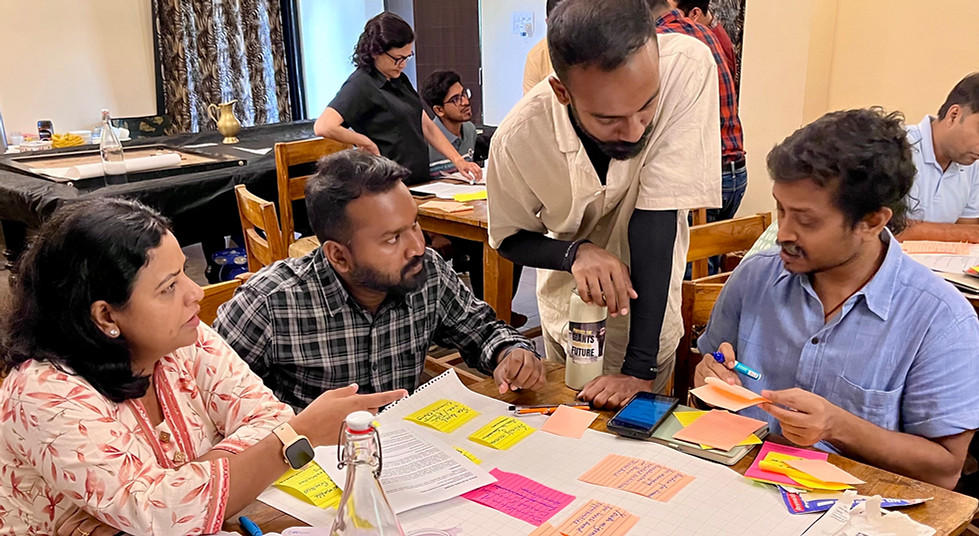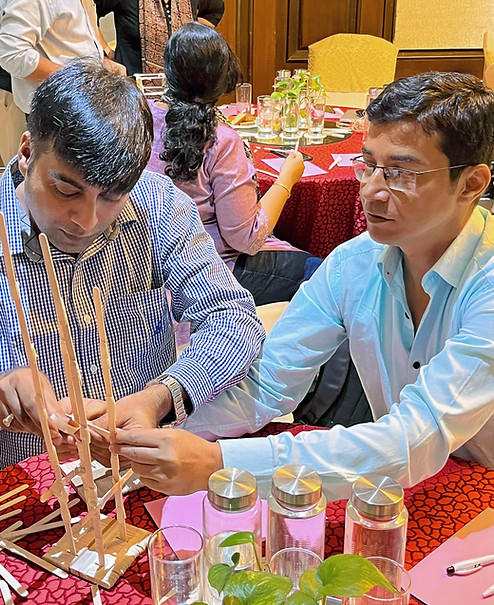READING TIME: 10 MINS
Globally, conservation organisations run impactful projects, from restoring ecosystems and reviving biodiversity to securing nature-based livelihoods for frontline communities. These efforts are vital, yet many organisations encounter a similar roadblock – while projects multiply, the systems needed to hold them together do not grow at the same pace.
This is the position Nature Environment & Wildlife Society (NEWS) found itself in after more than three decades of powerful conservation action. NEWS is a conservation non-profit based in Kolkata, working across India on biodiversity conservation, sustainable resource management, and community-led ecosystem governance and management. They grew rapidly in their programmatic footprint, but the underlying systems needed to manage this growth had not simultaneously evolved. Leadership recognised that to scale responsibly and sustainably, NEWS needed not more projects, but a stronger organisational backbone.


Starting From The Ground Up.
EcoNiche partnered with NEWS to undertake an 18-month organisational strengthening process covering four phases: diagnosis, strategy, systems design, and institutionalisation.
Our first step was to acknowledge a simple truth: systems cannot be built in a vacuum. They must sit on a foundation of shared purpose and priorities, and clearly articulated programmatic pathways. The NEWS Strategic Plan (2025–2030) became this foundation. Developed over several months, through consultations with leadership, project teams in the States of West Bengal, Assam, Uttar Pradesh and Tamil Nadu, governing body members, advisors, and community partners, the strategy defined:
-
Four overarching Program Goals: Conserving Biodiversity, Sustainable Natural Resource Management, Translating Knowledge into Action, and Organisational Health
-
Two Cross-Cutting Themes: Climate Resilience and Gender Inclusion
-
A full framework with ~12 program results, ~56 outputs & outcomes, and ~200 conservation impact indicators
-
A unifying theory of change anchored in stewardship, community leadership, and evidence-based practice
This clarity was essential. Without it, a Monitoring, Evaluation, Accountability and Learning (MEAL) framework would only measure activities, not impact. A Management Information System (MIS) would risk becoming a digital repository of spreadsheets rather than a strategic tool. Strategy had to come first because systems work only when we know what they exist to serve.
Amazed to see how the nitty gritty's of situational analysis of the organisation has been blended into the programmatic goals with detailed Key Result Areas (KRAs), SMART objectives, outputs and outcomes. Thanks to the EcoNiche team for the cognisance on organisation and impact management and growth. Great effort!
Ajanta Dey
Joint Secretary & Program Coordinator, NEWS

Designing An Organisation-Relevant MEAL Framework.
Many organisations attempt generic MEAL frameworks and quickly discover that these systems break down under real field conditions. Indicators may be too abstract; data requirements unrealistic; or workflows disconnected from on-ground realities. With NEWS, we inverted the process, from ground-up, ensuring engagement and participation at all levels. Instead of imposing a framework from the outside, we once again leaned on co-creation to develop the MEAL architecture.
The result was the NEWS MEAL Framework (2025–2030), a comprehensive, organisation-wide system that aligns directly with its new strategy and operational context. It includes:
-
A monitoring framework with clearly defined outputs, outcomes, indicators, and data collection methodologies,
-
A structured evaluation system grounded in internationally accepted criteria,
-
Clear roles, responsibilities, workflows and accountability structures,
-
Mechanisms for community and stakeholder feedback, and
-
A learning agenda that embeds reflection, adaptation, collaboration, capacity-building and evidence use into organisational routines.
This represented a transformative shift from primarily tracking activity-based implementation, to tracking what is changing: ecosystem health, species recovery, livelihood outcomes, governance effectiveness, organisational performance, climate resilience, and gender inclusion. It elevated impact from something implicit to something observable, measurable, and comparable across states, landscapes and shared collective goals across partner networks.


The MIS: Turning Evidence Into Daily Practice.
A MEAL framework without a functioning data system rarely survives over time. Many well-intentioned frameworks collapse at the point of implementation because teams lack the tools to manage data efficiently, consistently and with integrity. NEWS understood this early, and invested in building an integrated Management Information System (MIS) in parallel to the MEAL framework.
The MIS we designed is a modular, scalable architecture built around the Project/Program Management Cycle (PCM) and a hierarchy of MEAL indicators. It integrates data from project plans and logframes, activities and impact monitoring, financial records and budget reports, stakeholder engagement documentation, learnings and reflections, and risk registers.
The MIS brings this information together through live dashboards that combine impact from project → programme → organisation. With clearly defined aggregation logic, NEWS can now see, at any point, not just whether individual projects are progressing but how they collectively contribute to programmatic and organisational impact.
Crucially, the MIS is designed around workflows and analytics, not just data entry. This design shifts the system from being a passive repository of numbers to a backbone of organisational practice. Reporting becomes an embedded routine, not an administrative burden. Teams can engage more in thinking, interpreting patterns, assessing risks, and making course corrections, rather than just accumulating data.



System Design to System Co-creation: The Human Side of Change.
One of the most important lessons from NEWS’s transformation journey is that even the best-designed systems fail when built in isolation from the people who must use them. Conservation organisations often adopt tools that look excellent on paper but crumble in the realities of remote field sites, varying team capacities, and the everyday pressures of implementation. The turning point for us was shifting from system design to system co-creation.
Over 18 months, every component of the MEAL Framework and MIS was shaped through deep engagement with staff across roles, departments, states, and levels of comfort. Field teams contributed insights that grounded indicators in context-based realities; finance and HR teams shaped workflows that addressed bottlenecks; and leadership collaborated on decision rights and accountability structures that make reporting strategic rather than bureaucratic.
Equally important was the principle of simplification before digitisation. Before a single line of the MIS was built, NEWS and EcoNiche mapped and streamlined more than 20 organisational processes, removing duplication, clarifying responsibilities, and ensuring systems were fit for purpose. This prevented the common trap of digitising chaos.
Capacity-building, too, became a core part of the journey. Workshops, templates, coaching sessions, and joint reviews allowed staff to build confidence in using evidence, interpreting data, and engaging in adaptive management. Over time, the transformation has become not just structural but cultural: teams have begun to speak the language of evidence, reflection, and learning, with a fluency that was once limited.


The EcoNiche team did an outstanding job facilitating the process, creating an engaging and collaborative environment. Sessions were well-structured, allowing for clear communication and active participation from all attendees. The team ensured that every voice was heard, fostering an atmosphere of inclusiveness and thoughtful discussion. Their expertise in guiding us through complex topics like the MEAL framework familiarisation and finalisation was invaluable, providing us with clarity and actionable insights. Overall, the EcoNiche team's facilitation played a key role in making the workshop productive and successful.
Papai Dubey
MEAL Coordinator, NEWS
What We Commonly Get Wrong About Scaling.
The word “scale” is widely used in the social and environmental sectors but often misunderstood. Too often, organisations try to scale outputs (e.g., more hectares restored, more species surveyed, more communities engaged) without strengthening the organisational muscle required to sustain this expansion.
Scaling without strong support systems leads to burnout, not impact. It magnifies inefficiencies, multiplies reporting inconsistencies, and creates strategic drift because leadership spends its time reacting rather than guiding. Projects that should be vehicles for impact become liabilities when they outgrow organisational capacity.
NEWS confronted this reality early. Instead of asking, “How do we scale our projects?”, they asked, “What would it take for NEWS to scale well?” This shift unlocked a different set of priorities: strengthening governance, clarifying decision-making, roles and responsibilities, institutionalising data flows, aligning HR and finance with programmatic needs, and building tools for adaptive management.
The insight was simple but powerful: projects do not scale, systems do. When systems are strong, growth becomes intentional, disciplined, and resilient. When systems are weak, growth becomes fragile.

The Bigger Picture.
The challenges facing conservation – accelerating climate impacts, habitat degradation, rising pressures on communities, and shifting policy landscapes – demand organisations that are not just passionate, but resilient. Good projects can protect a habitat or species; strong organisations, like NEWS, can protect entire ecosystems across generations.
MEAL and MIS are not administrative add-ons; they are the foundations upon which credibility, accountability, and long-term impact are built. In a sector where funding cycles are short and ecological timelines are long, organisations must build the long-term muscles – clarity, discipline, evidence, governance, learning, and stewardship. NEWS chose to invest in these muscles, and in doing so, has positioned itself as a model for what many conservation organisations aspire to be: mission-driven, evidence-led, community-grounded, and capable of navigating complexity with confidence.
If the conservation sector is to meet the scale of the challenges ahead, more organisations will need to take this path, because systems are what support people and impact to endure.









